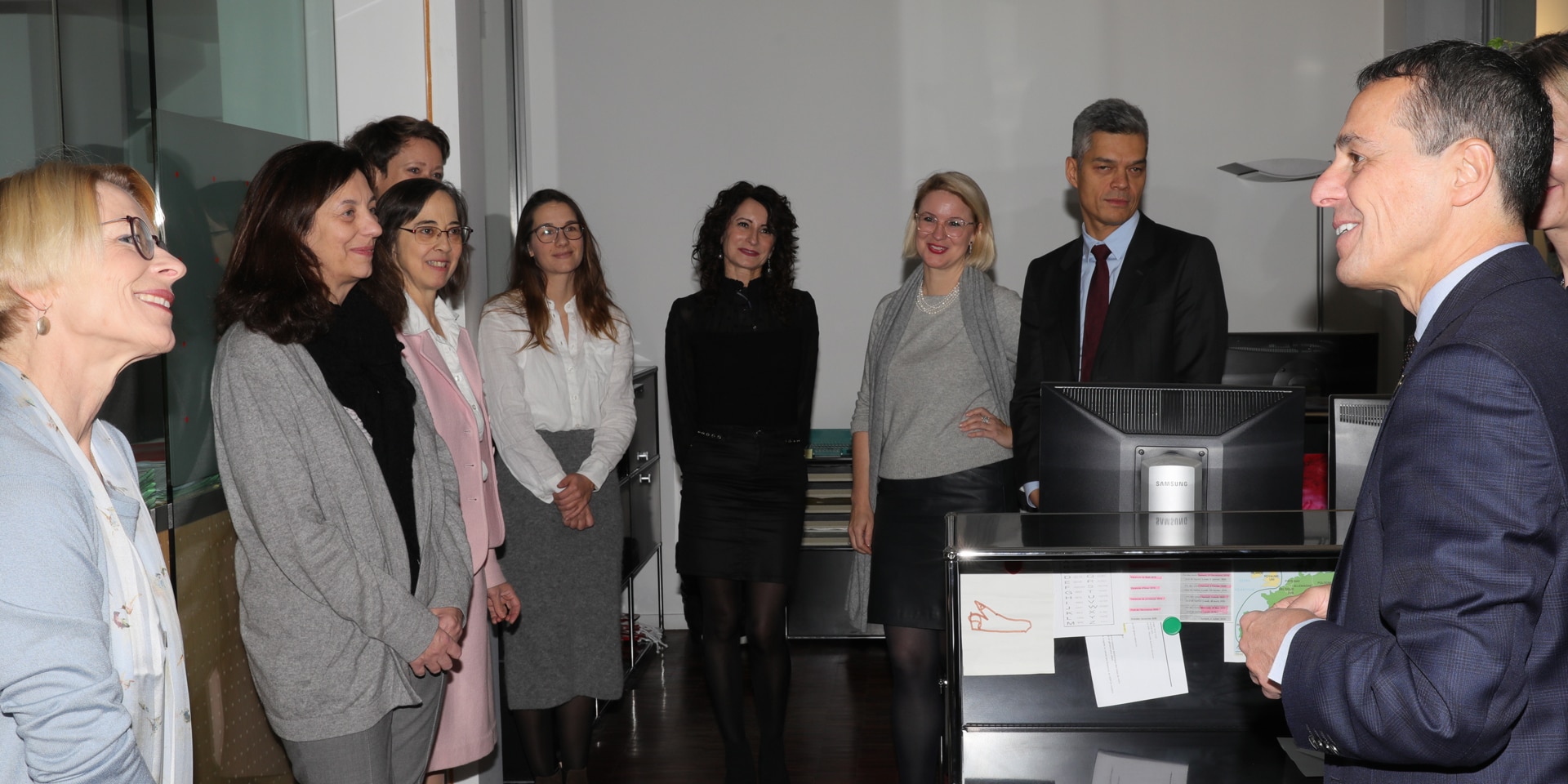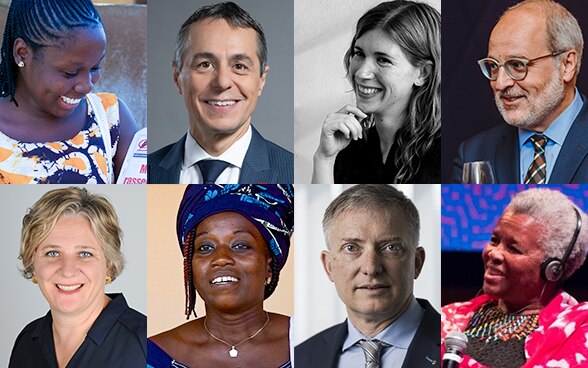8 March: "A person's gender must not be an issue"
International Women's Day is a reminder of the challenges that remain in terms of women's rights and world peace. Working on this is a continuous task, says Federal Councillor Ignazio Cassis. This is why Switzerland strengthens the status of women through projects in different countries and at multilateral level. Mr Cassis gives the FDFA good marks: he notes that with women making up 50,2% of its staff, the department is a leading example of gender equality in action.

Federal Councillor Ignazio Cassis talks with the staff of the consular section of the Swiss embassy in Paris. © FDFA
Federal Councillor Ignazio Cassis, how important is in your opinion International Day for Women's Rights and World Peace, which is celebrated every year on 8 March?
Strengthening the rights of women and working for world peace are key goals for Switzerland as well. Legal and de facto equality between women and men is enshrined in Article 8 of our Constitution. Peace and security are specifically mentioned in Article 2, which sets out the aims of the Federal Constitution. Gender equality and peace and security are therefore Switzerland's raison d’être. Equal rights for women and men are key to social cohesion and prosperity, which are also fundamental principles of the Swiss Confederation.
What role do these two constitutional provisions play in Switzerland's foreign policy?
They are ever-present. International Women's Day, which was established by the UN 45 years ago, reminds us on 8 March each year that much work remains to be done in the area of women's rights and in securing world peace. This issue is therefore an ongoing task for the Federal Council, which is responsible for Switzerland's foreign policy.
How does the FDFA accomplish this task in concrete terms?
At different levels – where we can have a concrete impact. This begins within the FDFA and is also part of our multilateral work and international cooperation projects, where human rights and peacebuilding are essential.
Let's start with the FDFA!
I take the principle of 'no discrimination in the workplace' as a guiding principle. At the FDFA a person's gender, language, sexual orientation, origin, religion or lifestyle cannot make any difference to the quality of their work or our recognition of their performance. The FDFA should be an attractive employer for the most qualified women and men.
What can you do specifically to promote women at the FDFA?
We must continue to put what I've just outlined into practice. For over ten years, the FDFA has been pursuing the goal of employing an equal number of women and men, particularly in management and executive positions. This is a key priority for me. Our long-standing efforts to promote gender equality have yielded results: On average, 50.2% of the FDFA's employees in 2019 and 52% at the end of the year, i.e. a majority, were women. The proportion of women in middle and upper management is now 46%, and 26% in top management. We are on the right track. When the new SDC Director General Patricia Danzi takes up her post next May, four of the department's seven directorates will be headed by women and three by men. This is clear evidence that for us, what matters is how qualified someone is to do a job, not their gender.
How does the FDFA promote legal equality for women and men outside the workplace?
Abroad, the FDFA operates in accordance with the Federal Council's Foreign Policy Strategy 2020–23 and the associated thematic (IC, host country, Switzerland's communication abroad) and geographical focus areas. We coordinate our specific positions with the other federal departments, for example the FDHA, which houses the Federal Office for Gender Equality. At the multilateral level, we support organisations such as UN Women and pursue our priorities in relevant bodies like the Commission on the Status of Women (CSW).
What does the FDFA do for women in the context of poverty reduction (IC strategy)?
In many countries we support projects that strengthen the economic empowerment of women. Women who have an education and a job can become more independent – also of traditional role expectations. We therefore promote equal access for women to the labour market. Or we help women to obtain microcredits more easily. This strengthens their position, particularly in rural economies, where women often play a central role in agriculture and food security.
International Women's Day is also dedicated to world peace. Does the FDFA's commitment to the status of women also serve this goal?
Yes. The lack of equal rights for men and women is in fact an obstacle to poverty reduction and sustainable development, and therefore to world peace. So when we promote gender equality, especially in the family, in education and the workplace, we are also promoting economic growth. In this way we contribute to the stability and security of the world and of Switzerland. Both are important building blocks for peace.
What specifically is the FDFA doing here?
With its fourth national action plan to implement UN Security Council Resolution 1325 on women, peace and security, Switzerland is meeting a major objective. In developing countries, we support the greater involvement of women in politics, especially at local level and in the management of public funds. We are committed to protecting women against violence and sexual exploitation, especially in conflict situations, and encourage their participation in peacebuilding measures.
What is the role of men when it comes to women's rights?
It won't work if men are not on board. Without equal rights for men and women, women's rights cannot be put into practice. Men and women are different, and this difference is a strength. But they must be equal before the law. This is the basis of our democracy today and it is also important to me personally, as a man and as head of the FDFA. The FDFA should play a model role here.
Profiles of eight women and men associated with the FDFA who are committed to women's rights. © FDFA
8 March: 8 women and men working for women's rights
8 women and men associated with the FDFA demonstrate the diversity of Switzerland's engagement around the world.

